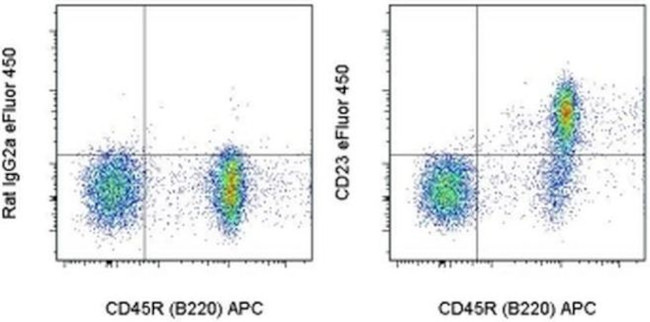Search Thermo Fisher Scientific
Invitrogen
CD23 Monoclonal Antibody (B3B4), eFluor™ 450, eBioscience™
FIGURE: 1 / 11
CD23 Antibody (48-0232-82) in Flow

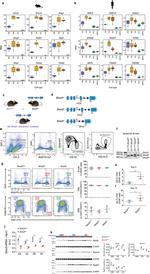
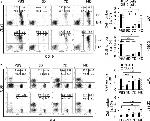
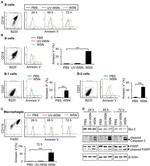
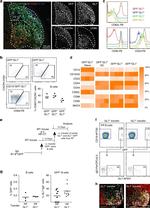
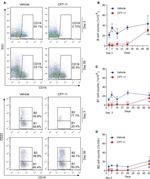

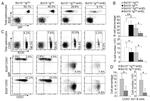
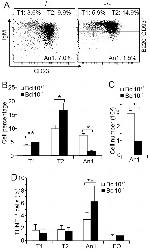
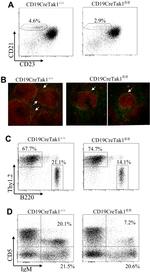
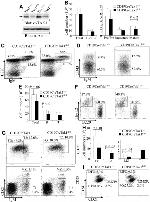
Product Details
48-0232-82
Species Reactivity
Published species
Host/Isotype
Recommended Isotype Control
Class
Type
Clone
Conjugate
Excitation/Emission Max
Form
Concentration
Purification
Storage buffer
Contains
Storage conditions
Shipping conditions
RRID
Product Specific Information
Description: The B3B4 monoclonal antibody reacts with mouse CD23, a 45 kDa type II transmembrane glycoprotein. CD23 is expressed on resting conventional B cells, and its expression is modulated upon B-cell activation. B-1 cell lineage (CD5+ B cells) does not express CD23. Soluble forms of the antigen have been reported to be biologically active. CD23 is a low affinity receptor for IgE and is thought to play a role in the regulation of IgE response and B-cell activation. CD21 is thought to bind to CD23.
Applications Reported: This B3B4 antibody has been reported for use in flow cytometric analysis.
Applications Tested: This B3B4 antibody has been tested by flow cytometric analysis of mouse splenocytes. This can be used at less than or equal to 0.5 µg per test. A test is defined as the amount (µg) of antibody that will stain a cell sample in a final volume of 100 µL. Cell number should be determined empirically but can range from 10^5 to 10^8 cells/test. It is recommended that the antibody be carefully titrated for optimal performance in the assay of interest.
eFluor® 450 is an alternative to Pacific Blue®. eFluor® 450 emits at 445 nm and is excited with the Violet laser (405 nm). Please make sure that your instrument is capable of detecting this fluorochome.
Excitation: 405 nm; Emission: 445 nm; Laser: Violet Laser.
Filtration: 0.2 µm post-manufacturing filtered.
Target Information
CD23 is a 45 kDa glycoprotein which is present on a subpopulation of freshly isolated peripheral blood and tonsil B cells and strongly expressed on EBV-transformed B lymphoblasts. The CD23 molecule is identical to the low affinity IgE receptor found on B cells. Expression of CD23 has been detected in neoplastic cells from cases of B cell chronic lymphocyctic leukaemia and some cases of centroblastic/centrocytic lymphoma. CD23 is present on a subpopulation of freshly isolated peripheral blood and tonsil B cells and strongly expressed on EBV-transformed B lymphoblasts. Functionally, CD23 is involved in B cell growth and differentiation, and IgE production. Further, CD23 has a soluble form that is a potent mitogenic factor. Diseases associated with CD23 dysfunction include chronic conjunctivitis and chronic lymphocytic leukemia.
For Research Use Only. Not for use in diagnostic procedures. Not for resale without express authorization.
How to use the Panel Builder
Watch the video to learn how to use the Invitrogen Flow Cytometry Panel Builder to build your next flow cytometry panel in 5 easy steps.
Bioinformatics
Protein Aliases: CD23; FC epsilon RII; Fc-epsilon-RII; FceRII; Low affinity immunoglobulin epsilon Fc receptor; low-affinity IgE receptor; Lymphocyte IgE receptor
Gene Aliases: CD23; Fce2; Fcer2; Fcer2a; Ly-42
UniProt ID: (Mouse) P20693
Entrez Gene ID: (Mouse) 14128

Performance Guarantee
If an Invitrogen™ antibody doesn't perform as described on our website or datasheet,we'll replace the product at no cost to you, or provide you with a credit for a future purchase.*
Learn more
We're here to help
Get expert recommendations for common problems or connect directly with an on staff expert for technical assistance related to applications, equipment and general product use.
Contact tech support
